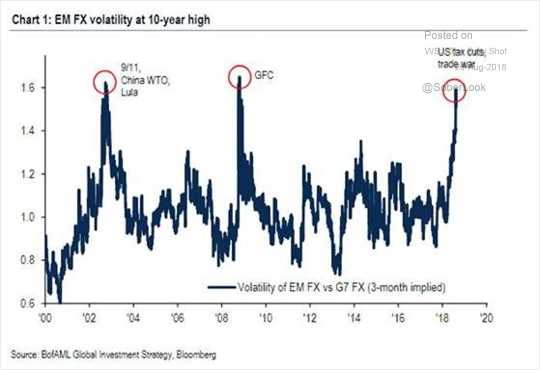Do you remember Domino Day? That painfully iconic European event where students from across Europe tried to set records for how many dominos they could set up and knock over?
Well, it’s back. Only this time, it’s emerging markets that are falling instead of dominos.
My friend Shae Russell has been warning about Turkey for months now. Her readers in Australia are perfectly positioned for the emerging market mayhem that’s unfolding.
Last night, she sent me this chart. It seems to have lost all its resolution after a long chain of republications, email forwards and reposts in blogs and newsletters. But it still shows that emerging market foreign exchange volatility is at a ten-year high:

Source: BofAML, @DriehausCapital
Only the global financial crisis and 9/11 can match the level of turmoil we’re seeing now.
Overnight, two more events in emerging markets shook financial markets.
Russia’s government announced it will abandon an attempt to raise money today. The Russian Finance Ministry blamed volatility for the decision, effectively a reference to the chart above.
The rouble is at a two-year low, making it hard to repay any foreign currency denominated debt. Russia learned its lesson on this from the 1990s. It doesn’t have much foreign debt any more. But it still struggles to find buyers when currency markets are so volatile.
Over in Brazil, things are already far worse. The currency is in a slow-motion train wreck. It has lost 8% of its value since early August and more than 20% for the calendar year so far. It hit the symbolic level of 4 real per dollar on Monday.
Imagine a 20% increase on your mortgage bill… Some companies in Brazil face just that.
Bloomberg blames the upcoming elections in Brazil for the turmoil. Market-friendly candidates are lagging.
Argentina was the first emerging market to fall, seeking help from the International Monetary Fund months ago.
It’s beginning to look like dominos. The obvious question is who is next.
Poland gets plenty of attention thanks to its foreign debt, which is just as bad as Turkey’s.
But if you’re watching the individual dominos fall, you’re missing where all of this is leading. The real question is whether the dominos put together are big enough to cause a major problem in all financial markets globally.
In a way, they already have. This chart from the Financial Times shows how stockmarkets around the world are falling while US stocks are climbing.
This also confirms the theory that it’s American monetary policy which is behind the turmoil in emerging markets.
The rising interest rates make the US dollar more attractive and cause it to rise. This makes US dollar debt more expensive on both counts for foreign countries.
Emerging market politicians find themselves in the awkward position of agreeing with Donald Trump. US monetary policy is tightening too fast.
The real problem is that it’s tightening out of synch with everyone else.
In Italy and Spain, there’s fear the emerging market defaults will cause problems for the local banking systems. Southern Europe lent money to emerging markets.
But before you feel smug, British banks lent the southern European banks money to do so…
The line of dominos do lead to Britain, eventually.
Solutions to the emerging market Domino Day
So what can you do about the risks that emerging markets pose?
Don’t worry, the politicians are on to the problem already.
Germany’s Chancellor Angela Merkel has supposedly ruled out a Turkish rescue. That’s according to the secretary general of Merkel’s Christian Democrat Union (CDU) party.
Which is a surprise given Turkey holds the keys to the immigration gates of Europe. In 2016, President Recep Tayyip Erdogan threatened to unleash three million immigrants on the EU…
But if you look more closely at what the German media is saying, Chancellor Merkel’s position is that there is no need to bail out Turkey… yet.
Germany’s foreign minister has floated a solution that’s popular in places like Iran, China and Russia. A payments system that is not US dollar centric.
The idea is to make the US dollar less important in global exchange, and to circumvent the power the US has over global financial transactions. That should make the US dollar less important to funding markets too. And less valuable.
The Turks aren’t waiting for politicians to solve their problems. They’re turning to safe havens.
The gold price is spiking in terms of Turkish lira.
The market research firm Statista reports Europeans and others were polled by ING to find out how many hold bitcoin or similar cryptocurrencies. An extraordinary 18% of Turks do, double the European average.
Turkey, Romania, Poland and Spain make up the top four when it comes to bitcoin holders. The UK, France, Belgium and Luxembourg are the bottom four. Do you see the correlation between trustworthy banking systems and currencies vs those which are not?
So, do you trust the politicians to solve the problem of emerging market Domino Day? Or are you acting now to protect yourself?
Brexit is embarrassingly successful
Meanwhile, back at home, things are looking a little different. The re-emerging market of Britain after the Brexit referendum is doing rather well.
Government borrowing is at its lowest level in 16 years. There’s even a particular sort of budget surplus known as a “current budget surplus”, meaning we’re taxing more than we’re spending… on certain things. Next year, we might even have a proper surplus, all spending included.
Most extraordinary of all, we’re borrowing less than the government’s forecasts. It took an official line on Brexit doom and gloom to pull that off.
But the government failed to deliver on its own gloomy forecasts, even with less spending. So now they’re claiming victory, naturally. They’re paying down debt and even considering spending money on the NHS.
More and more, the Brexit success is sucking in Britain’s mainstream politicians. Perhaps that is the real narrative here. Brexit is so good, even remain politicians are increasingly backing it because it allows them to take credit for the success.
Britain’s exports hit a record too, reaching 30% of GDP.
The new fear is that Brexit will be so successful it causes the pound to surge…
How embarrassing.
Until next time,
Nick Hubble
Capital & Conflict
Category: Market updates


